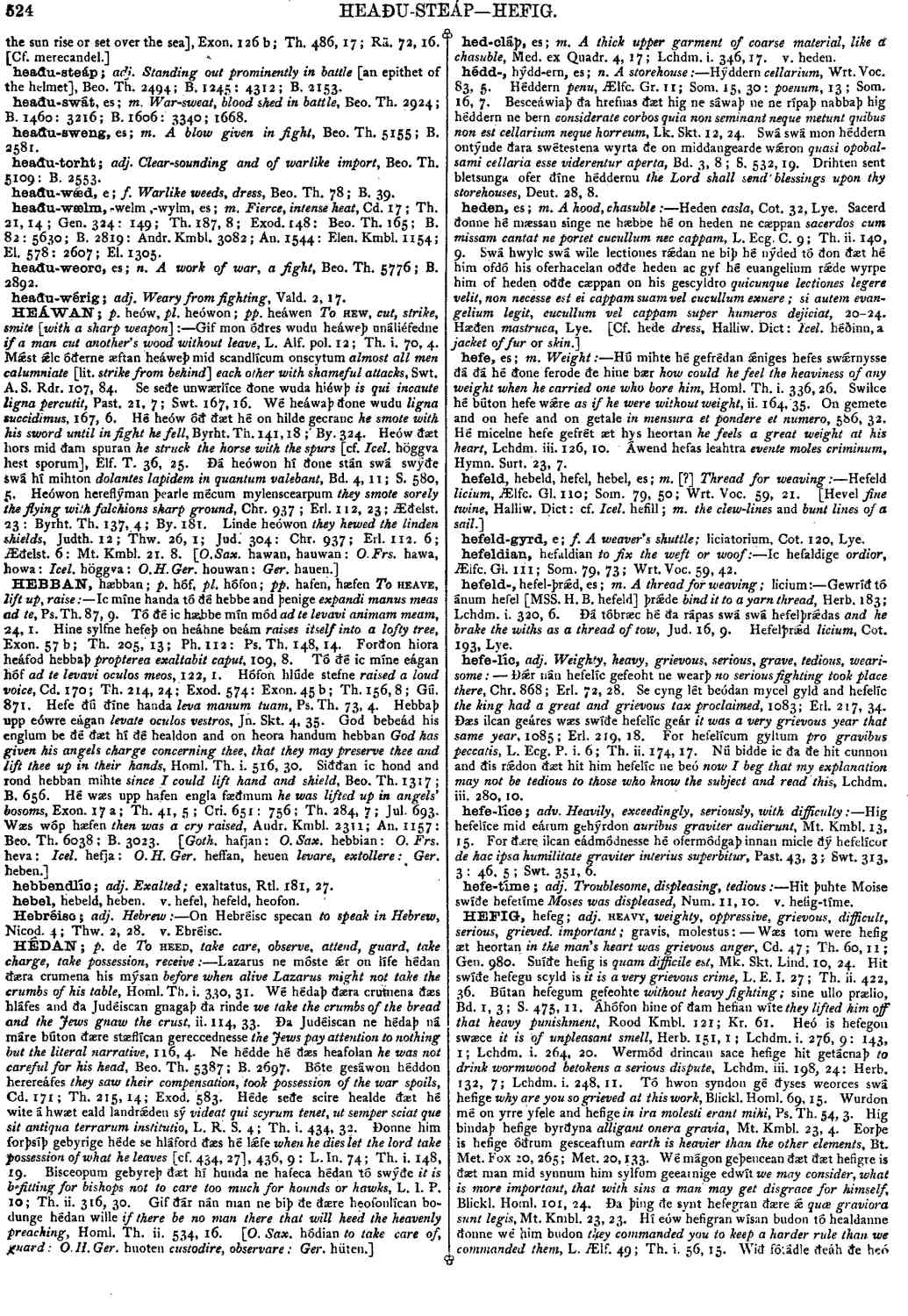HEFIG
- adjective
-
Wæs torn were hefig æt heortan
in the man's heart was grievous anger,
- Cd. 47; Th. 60, 11 ;
- Gen. 980.
-
Suíðe hefig is
quam difficile est,
- Mk. Skt. Lind. 10, 24.
-
Hit swíðe hefegu scyld is
it is a very grievous crime,
- L. E. I. 27; Th. ii. 422, 36.
-
Bútan hefegum gefeohte
without heavy fighting;
sine ullo prælio,
- Bd. 1, 3; S. 473, 11.
-
Áhófon hine of ðam hefian wíte
they lifted him off that heavy punishment,
- Rood Kmbl. 121; Kr. 61.
-
Heó is hefegon swæce
it is of unpleasant smell,
- Herb. 151, 1; Lchdm. i. 276, 9 :
- 143, 1; Lchdm, i. 264, 20.
-
Wermód drincan sace hefige hit getácnaþ
to drink wormwood betokens a serious dispute,
- Lchdm, iii. 198, 24 :
- Herb. 132, 7; Lchdm. i. 248, 11.
-
Tó hwon syndon gé ðyses weorces swá hefige
why are you so grieved at this work,
- Blickl. Homl. 69, 15.
-
Wurdon mé on yrre yfele and hefige
in ira molesti erant mihi,
- Ps. Th. 54, 3.
-
Hig bindaþ hefige byrðyna
alligant onera gravia,
- Mt. Kmbl. 23, 4.
-
Eorþe is hefige óðrum gesceaftum
earth is heavier than the other elements,
- Bt. Met. Fox 20, 265 ;
- Met. 20, 133.
-
Wé mágon geþencean ðæt ðæt hefigre is ðæt man mid synnum him sylfum geearnige edwít
we may consider, what is more important, that with sins a man may get disgrace for himself,
- Blickl. Homl. 101, 24.
-
Ða þing ðe synt hefegran ðære ǽ
quæ graviora sunt legis,
- Mt. Kmbl. 23, 23.
-
Hí eów hefigran wísan budon tó healdanne ðonne wé him budon
they commanded you to keep a harder rule than we commanded them,
- L. Ælf 49; Th. i. 56, 15.
-
Wíð fótádle ðeáh ðe heóhefegust sý
for gout, though it be very bad,
- Herb. 132; 4; Lchdm. i. 246, 22.
-
Mid ðon gewunon ðære heofogoston gewemmednesse synna
with the habit of the most grievous impurity of sins,
- Blickl. Homl. 75, 6.
Bosworth, Joseph. “HEFIG.” In An Anglo-Saxon Dictionary Online, edited by Thomas Northcote Toller, Christ Sean, and Ondřej Tichy. Prague: Faculty of Arts, Charles University, 2014. https://bosworthtoller.com/18588.
Checked: 1